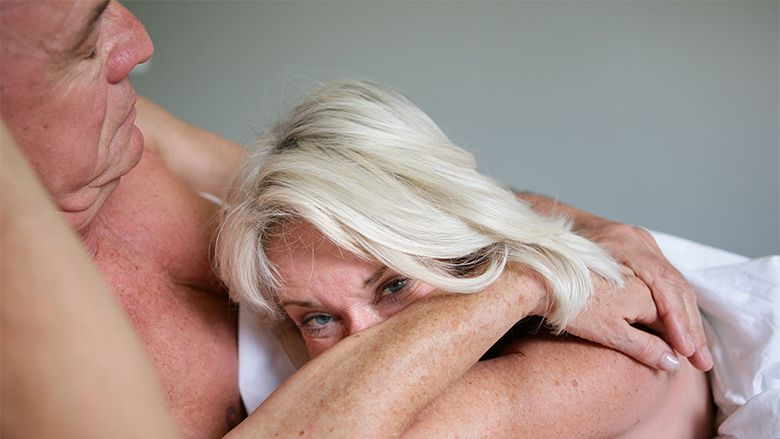Sexual Health in Older Women: New Study Shows Intimacy Remains Important After 65
A new study published in Menopause shows that older women face sexual health issues as often as younger women, but report less distress. Learn why intimacy after 65 still matters and why open conversations in India are important.

Published: August 23, 2025 | Nimcy Manu
When we talk about sex and intimacy, most people think of young couples or women in their middle age. But a new study published in Menopause, the journal of The Menopause Society, shows that women above 65 years also face sexual health problems — just like women in their 40s or 50s.
The surprising part is this: while older women experience almost the same level of sexual issues as younger women, they feel less upset or worried about these problems.
This raises an important question — is it because older women have accepted these changes as “normal,” or is it because no one talks about solutions?
What the Study Found
The research involved nearly 3,500 women. They compared two groups:
-
Women aged 50–64 years (midlife group)
-
Women aged 65 and above (older group)
The study found:
-
Both groups reported sexual difficulties like loss of desire, dryness, or less pleasure.
-
Women above 65, however, reported less distress — meaning they did not feel as emotionally troubled about these issues compared to the younger group.
For example, a 68-year-old woman may say, “Yes, I don’t feel as much sexual desire as before, but I am okay with it,” while a 52-year-old woman may say, “I feel very worried that my relationship is suffering because of this.”
Sex Life After 65 – The Reality
Many people assume sex ends after menopause, but studies prove otherwise.
-
More than 37% of women over 65 are still sexually active.
-
Even among women above 85 years, around 10% continue to enjoy intimacy.
Country like India, Pakistan too, this reality exists — but it is rarely spoken about. Older women often keep quiet about these issues due to shame, stigma, or fear of being judged.
Imagine this: a grandmother in her late 60s may silently face vaginal dryness or low desire, but she never shares it with her doctor or family. On the other hand, a woman in her early 50s might still bring it up during a gynecology visit, because she’s closer to menopause age where people expect such issues.
Why Do Older Women Report Less Worry?
Researchers believe there are a few reasons:
-
Acceptance of Age
Older women may think, “This is part of aging, I should adjust.” -
Lower Expectations
A 70-year-old woman may not expect her body to respond the same way as it did at 40. -
Emotional Strength
As people age, they often become more emotionally stable. They learn to focus on companionship and emotional closeness rather than only physical intimacy.
This doesn’t mean sexual health is less important — it only means many women silently adjust instead of seeking help.
What Is Female Sexual Dysfunction (FSD)?
Doctors use the term Female Sexual Dysfunction (FSD) for problems like:
-
Low desire
-
Difficulty in arousal
-
Painful sex
-
Lack of orgasm
For it to be called FSD, these problems must last at least 6 months and cause personal distress.
Globally, studies show that 22% to 43% of women suffer from FSD. But here’s the problem — most of the research and treatments focus only on younger and middle-aged women, not seniors.
Why Doctors and Families Should Pay Attention
Dr. Stephanie Faubion, medical director of The Menopause Society and one of the authors of this study, explains:
“It is important to address sexual health concerns at any age. This study highlights the need to continue screening for and managing sexual health throughout a woman’s entire lifespan.”
This means doctors should ask older women about sexual wellbeing — the same way they ask about blood pressure or diabetes. Families, too, should understand that intimacy in older age is normal and healthy.
What Older Women in India Can Learn From This Study
-
Talk Openly: Do not hesitate to tell your doctor about sexual discomfort, dryness, or loss of desire. Just like you ask about joint pain, you can ask about sexual health.
-
Simple Treatments Exist: Vaginal moisturizers, hormone therapy, lifestyle changes, or counseling can improve sexual wellbeing.
-
Companionship Matters: Even if sexual activity reduces, intimacy, touch, and closeness remain important for emotional health.
For example, a 66-year-old woman may not want frequent sex, but she may still enjoy holding hands, cuddling, or emotional closeness with her partner. These are also part of sexual wellbeing.
Conclusion: Intimacy Has No Age Limit
This study makes one thing clear: sexual health does not end after 65. Older women may not always complain, but that doesn’t mean they don’t face challenges.
As India’s senior population grows, it is time to break the silence around sexual health in older age. Addressing these concerns not only improves intimacy but also emotional wellbeing and overall quality of life.
Comments
No comments yet. Be the first to comment!